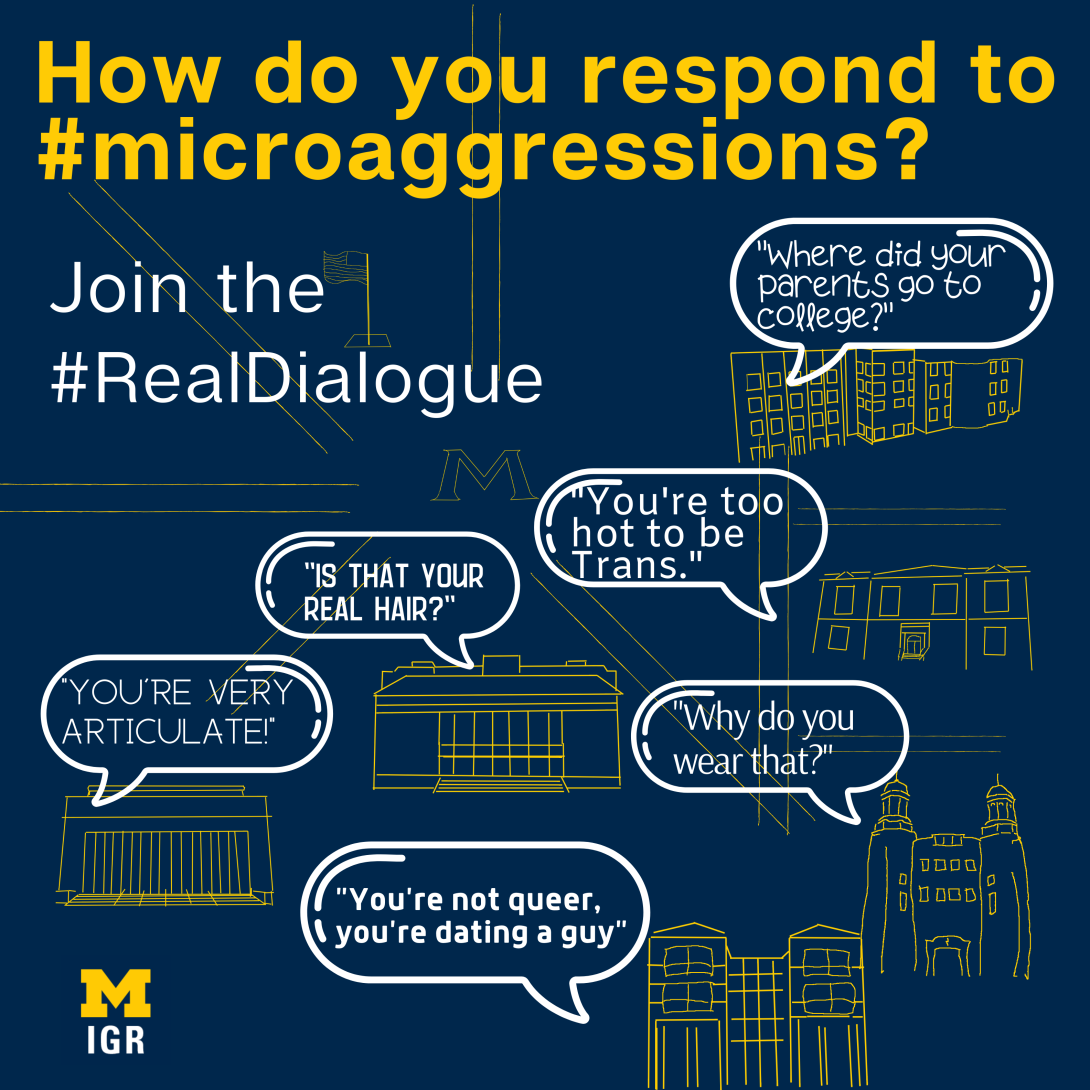November 12, 2019 | By Hannah Brauer (she/her/hers), Photographer/Writer Student Lead
Small, hurtful actions impact our campus every day, whether it’s from the professors who schedule tests on religious or cultural holidays, the coworkers who don’t use an intern’s correct gender pronouns, or the students who make assumptions about a classmate based on their appearance.
We’ve all seen these moments occur — and they may seem insignificant to those responsible or to bystanders who don’t understand the implications of these microaggressions. This is because microaggressions, or everyday slights (verbal or nonverbal) that communicate hostile messages towards marginalized groups, are often born from implicit bias. However, it’s not the intent that matters in these situations, but rather the impact.
Elsa Ramesh (she/her/hers), IGR co-facilitator and senior studying business administration with minors in CASC and IGR, has experienced microaggressions firsthand. As an international student from South Africa, she expressed that many assume she isn’t a fluent English-speaker. She recalled peers being shocked at her high performance on essays during her first-year writing requirement.
“I usually just laugh it off, but internally I am left confused and slightly annoyed every time… Why do you assume international students should have poor English skills?” said Ramesh. “I informed [the other students] about English being a commonly spoken language in South Africa, but this was met with slight defensiveness and an elaborate explanation about what they meant.”
The idea of “intent versus impact” was also shared by Hoai An Pham (she/her/hers), who has also taken IGR courses and graduated Spring 2019 with a major in Social Theory & Practice concentrating on implicit racial bias. Pham cited the issues with WeListen, a campus group that “operates on the idea that everyone is coming from a valid place: that you have something to teach the other person, and you'll learn together.”
However, despite their intent, Pham expressed the organization actually forces oppressed groups to “validate their oppression to their oppressors.”
“The unfortunate reality of existing under a cis-hetero white supremacist patriarchy built on anti-Blackness, genocide, and colonization means that dialogue cannot actually exist without acknowledging power structures,” said Pham. “The things that people say have very real consequences that reinforce oppression. And when we reinforce oppression, we are engaging in harm towards marginalized people.”
As an IGR co-facilitator, Ramesh emphasized that dialogue must recognize power structures to dismantle microaggressions, rather than fuel them.
“The purpose of dialogue is to create a space for peers to share personal experiences and understandings of specific topics, social identities, or power/privilege/oppression,” said Ramesh. “This allows us to dig into the core assumptions and biases that exist underneath microaggressions that are expressed during dialogue.”
When intervening in an act of microaggressions, Ramesh noted that, if the situation is safe, one can challenge it “through genuine questions or personal experiences to push them to understand the impact of their words.”
Pham recommended focussing on the person being impacted rather than ignoring the situation or making it about yourself.
“Do not expect them to have to speak up for themselves, or be the lone voice in speaking up for themselves — if you choose to speak up, back up what they're saying, and their actions,” she said. “People with privilege [will] listen to others with privilege: so use yours to give others a platform.”
Above all, Pham encouraged others to continue combating the negative socialization that creates microaggressions.
“All of this is a continuous and lifelong process. We are never going to be perfect, and we are going to make mistakes. But engaging in the unlearning internalized oppression, committing to learning history and theory, and listening to marginalized voices are key practices that we need to work towards a better society.”
Learn more about IGR dialogue at igr.umich.edu.
This article was featured in CAs, a community newsletter through IGR for students interested in social justice education. Subscribe to stay informed on all things IGR.

